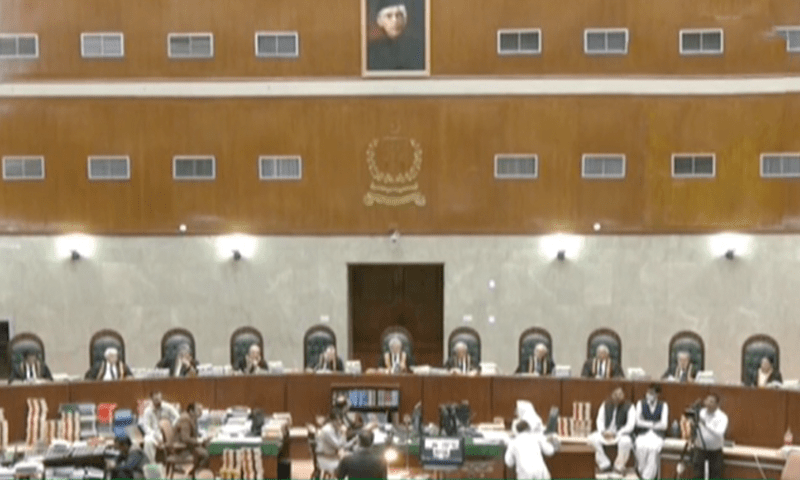The Supreme Court on Wednesday sustained the Supreme Court (Practice and Procedure) Act 2023 which deals with the Chief Justice’s powers as constitutional with a 10-5 majority verdict. According to the details, the full court, comprising all 15 judges of the apex court, announced the already reserved verdict on the pleas challenging the law after conducting five marathon hearings. The recent verdict of the apex court acknowledges the parliament’s right to legislation under Article 191, which states that the Supreme Court rules are subject to the Constitution. The law will be effective from April 21, 2023, the day it was enacted, which means the SC verdicts under 184(3) which came after this date can be appealed for review, including the NAB Amendments Act 2023 that was previously annulled by the apex court bench headed by the former Chief Justice Umar Atta Bandial just days before he retired from the position of the top judge.
In an unexpected and surprising development, the full bench of the Supreme Court of Pakistan finally issued a historic judgment in contract to the institutional interest and personal ego by upholding the real soil of the constitution that vested the legislative powers in the Public representatives and parliament whatsoever and whoever they deem appropriate to the public interest and country’s constitutional and administrative needs. The apex court, particularly the incumbent Chief Justice relinquished his sole power of sou motu notice which the recent amendment handed over to a three-member committee comprising senior judges including the Chief Justice.
It further aimed to have transparent proceedings in the apex court and includes the right to appeal together with the constitution of benches, every cause, matter, or appeal before the apex court would be heard and disposed of by a bench constituted by a committee comprising the CJP and the two senior-most judges. All those powers were previously the sole prerogatives of the Chief Judge until now. Realistically, after the Pakistan military’s quest for the apolitical role, the top judiciary relinquishing its unlimited powers and self-assumed political role is another landmark event in the country’s history that would have a great impact on national politics, rule of the law and justice delivery to the public in the coming days. Historically, this is the second magnificent act of self-sacrifice or self-accountability of an institution in the history of Pakistan, after President Asif Zardari voluntarily relinquished his power under article 58 (2)B through the 18th amendments during the PPP’s government more than a decade ago. In fact, those rational decisions not only strengthened the Constitution and democracy but have set landmark examples of selfishness, patriotism and the rule of the law.
The recent 10-5 verdict clearly highlights the difference of opinion and distinctive interpretation of the same law by the top judges, along with exposing polarization and grouping within the top judicial body. That problem not only exists in the top court but the entire judicial system including higher courts and district courts are deeply polarized and frustrated due to Institutional politics, nepotism and corruption, while pressure and blackmail from the lawyers further undermine the autonomy and conduct of the lower courts at the all levels.
The judiciary is an important pillar of the state that plays an important role through impartial and timely delivery of justice to the public, however, egoistic and biased approaches of the bar and the bench have caused serious judicial and political issues in the country. Currently, our judicial system needs strict reforms and self-accountability that not only curb corruption and nepotism in the institution but instil new vigour and enthusiasm in the adjudicators and the lower staff. The Chief Justice and the top judges have initiated an appreciable reform or accountability from the top, that must be applied on all tiers without exception so the judges’ decisions speak for themselves practically instead of the media releases or telethones.







